Part 2 Closing down sale - Part
3 A great escape - Results and table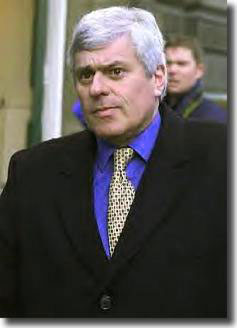
By the summer of 2002, for those who were willing to see it, the writing
had been on the wall for Leeds United for several months. The lacklustre
end of season form had been merely the symptom of a deep running malaise.
After topping the Premiership table at the turn of the year, the side
had enjoyed a nightmarish spell in the spring, punctuated by insidious
rumours of dressing room unrest.
However, it was the precarious financial position that gave the greatest
cause for concern.
At the beginning of March, chairman Peter Ridsdale announced interim
losses of £14m, adding that there was a pressing need to lower the club's
debt burden. At least £15m was required from player sales in order to
improve liquidity. Long-term borrowing had risen to more than £85m in
the pursuit of the golden egg of the Champions' League. Now, it was clear
that the price of failure was crippling. Ridsdale sanguinely demanded
the sale of six players: 'One of the transfers will probably be more than
£10m with three or four smaller deals made up of squad players who are
not regular first-teamers. The amount left for the manager to spend will
depend on European qualification.'
The news confirmed fears in the City that the club had borrowed much
too heavily. The squad was independently valued at £198m but the share
price placed the worth of the entire club at just £25m.
A late revival on the pitch helped to secure a place in Europe, but in
the less attractive environs of the UEFA Cup, rather than the Champions'
League, and it was estimated that the difference between the rewards on
offer was more than £20m.
On the playing side, the club was resigned to the departure of Lee Bowyer.
The dynamic midfielder's relationship with the chairman had been badly
soured following his acquittal from charges of grievous bodily harm. Ridsdale
insisted that Bowyer should pay a fine for his drunken misbehaviour while
Bowyer was equally resolute that the fine was both unfair and excessive.
There was only a year to go on the Londoner's contract and permission
had been given for Liverpool to discuss a move. Leeds had hoped for a
£15m fee, but in the end agreed on £9m. The deal had been all but sealed,
but at the twelfth hour it fell apart, with Liverpool manager Gerard Houllier
claiming that Bowyer was not wholly committed to a future at Anfield.
It was a shock to all concerned, and left Leeds in a sticky financial
position, needing to raise funds, but finding it increasingly difficult
to find takers for any but the most valued assets.
One major transfer did eventually go through and proved a particularly
bitter pill for the Elland Road faithful to swallow. Captain Rio Ferdinand
had proven himself possibly THE jewel in the Leeds crown after his record
breaking £18m move from West Ham a couple of seasons previously. His outstanding
performances during the World Cup finals in Japan and South Korea prompted
transfer rumours and the newspaper talk unsettled the player, as did his
discussions with squad colleagues while he was in Asia. Ferdinand roomed
with Manchester United defender Wes Brown, while David Beckham, Paul Scholes
and Gary Neville were also on hand to hint at the advantages of playing
for their club.
Peter Ridsdale gave assurance after assurance that the club would not
sell Ferdinand, and the player himself professed his loyalty. However,
the promises were empty and a £30m record fee was eventually agreed with
Manchester United. Ferdinand became an Old Trafford player on 22 July,
provoking bitter reaction from fans, distraught at the news of another
favourite deserting the club. The fact that it was the reviled Red Devils
and the lure of filthy lucre behind the move made the taste an even more
bitter one.
By then, more controversy had engulfed Elland Road, as manager David
O'Leary was sensationally and suddenly sacked on 27 June. The press release
read: 'After four successful years the pressures of some of the off-field
incidents have resulted in the company deciding that it would be beneficial
for a change of manager. It is hoped that news of a successor can be announced
in the next few weeks. Leeds United would like to place on record its
thanks for David's enormous contribution over the last four years.'
The public statement hid cracks in a relationship which had become increasingly
fractious. The Guardian's Daniel Taylor wrote: 'Had O'Leary not
been prone to so many foolish utterances and crass errors of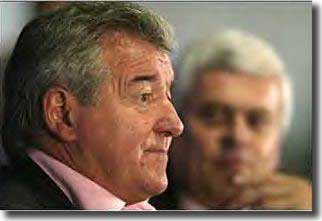 judgment, it is a safe bet his relationship with Ridsdale would not have
disintegrated to the point that his first day on holiday will be spent
contemplating a new life among the nation's unemployed.
judgment, it is a safe bet his relationship with Ridsdale would not have
disintegrated to the point that his first day on holiday will be spent
contemplating a new life among the nation's unemployed.
back to top
'What has become apparent is that Ridsdale has become increasingly resentful
towards O'Leary. The lack of silverware was not enough to justify O'Leary's
sacking. Likewise, his implied criticism of the plc over the proposed
sale of Rio Ferdinand has been annoying but not earth-shattering. And
O'Leary is certainly not the first manager to be disliked by his players,
even if it has reached the point where one first-teamer, at a recent club
function, refused to sign a book bearing the manager's picture.
'Where O'Leary made his fatal error is by persistently upsetting a chairman
whose nickname of Publicity Pete reflects his obsession with the club
- and himself - being seen in a positive light. Ridsdale was appalled
by the level of criticism that O'Leary brought upon the club by releasing
Leeds United on Trial immediately after the court case involving
Lee Bowyer and Jonathan Woodgate, so becoming the one person at Elland
Road to profit financially from the revolting street attack on the Asian
student Sarfraz Najeib. Over the last few months, Ridsdale has watched
with dismay as the media have launched a sustained campaign against O'Leary,
himself and the club.'
As speculation turned to the matter of who would succeed O'Leary, many
felt that Ridsdale would attempt once again to lure Martin O'Neill, who
had been the original favourite when O'Leary was appointed in 1998, but
Celtic acted quickly to block any move. O'Leary himself believed Ireland
manager Mick McCarthy had already been lined up by his former masters,
while newspaper talk focused on Middlesbrough boss Steve McLaren.
In the end, however, former England main man Terry Venables was the shock
appointment at the beginning of July. Ridsdale spoke glowingly as an initial
two-year contract was agreed: 'I had lunch with Terry in Spain on Saturday
and within 10 minutes, so infectious is his enthusiasm, that he has you
believing that you can play for England. I firmly believe we have the
best - the very best. Players respect him, coaches admire him and I do
think that Terry is special.
'For tangible evidence of his qualities you only have to look at the
incredible rescue act he performed at Middlesbrough the season before
last. Barring a miracle they were down and out of the Premiership with
not even a hope of survival. They couldn't get a result to save their
lives, but in walked Terry and from the moment he made his entrance things
changed for the better. It takes a special man to be able to do that.'
Venables had been out of the game since the Middlesbrough role in 2000/01,
and was released by ITV from his contract as a TV pundit to take up the
Leeds job. Venables was as pleased as Ridsdale with the deal: 'It has
all happened so quickly. I had a call from Leeds at my home in Spain when
I was told they wanted to meet me. The whole business had been conducted
like a whirlwind. It was irresistible. What surprises me most is how good
I feel about taking on this job. I am excited by the thought of it, genuinely
excited.'
There was much talk of the new players Venables would bring in. Expectancy
was high and there seemed to be new rumours every day of big money deals.
However, reality soon began to bite, and the only arrivals were two experienced
midfielders the manager had worked with previously in Paul Okon and Nicky
Barmby.
Okon was the Australian national team captain and had figured for his
country in the period when Venables was in charge. He had also worked
with the coach at Middlesbrough, and had played in Italy with Lazio. He
had been released on a free transfer by Watford.
Barmby moved from Liverpool for £2.75m, but had probably enjoyed his
best form at the start of his career when he played under Venables at
Tottenham. He had gone on to win England caps and had also played for
Middlesbrough and Everton.
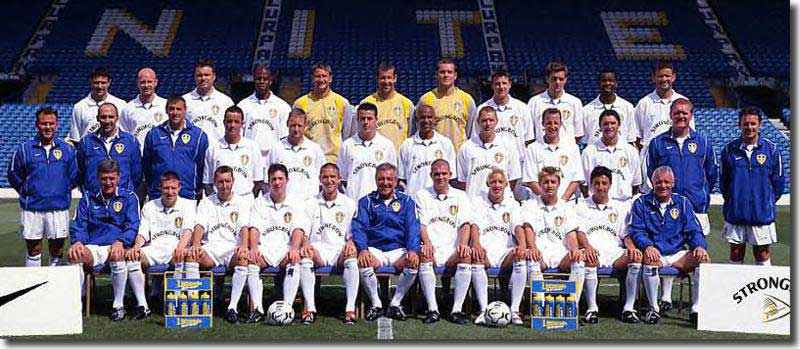 The
Leeds United faithful started to rumble and grumble as days went by with
no more news, but there was still a crowd of 40,000 plus for the opening
game, as newly promoted Manchester City visited Elland Road. Young keeper
Paul Robinson was preferred in the net to Nigel Martyn, following the
England international's decision not to accompany the squad on a pre-season
tour, while Barmby made his debut. A fit again Lucas Radebe partnered
new captain Dominic Matteo at the heart of the defence, with Danny Mills
and Ian Harte also present after good showings in the World Cup finals.
Eirik Bakke and Lee Bowyer completed the midfield set up, while the manager
went for three up front with Mark Viduka, Alan Smith and Harry Kewell.
The 4-3-3 formation looked interesting and hinted at a refreshing approach.
Venables had spoken of his desire to employ Kewell as an out and out striker,
rather than his customary left flank role.
The
Leeds United faithful started to rumble and grumble as days went by with
no more news, but there was still a crowd of 40,000 plus for the opening
game, as newly promoted Manchester City visited Elland Road. Young keeper
Paul Robinson was preferred in the net to Nigel Martyn, following the
England international's decision not to accompany the squad on a pre-season
tour, while Barmby made his debut. A fit again Lucas Radebe partnered
new captain Dominic Matteo at the heart of the defence, with Danny Mills
and Ian Harte also present after good showings in the World Cup finals.
Eirik Bakke and Lee Bowyer completed the midfield set up, while the manager
went for three up front with Mark Viduka, Alan Smith and Harry Kewell.
The 4-3-3 formation looked interesting and hinted at a refreshing approach.
Venables had spoken of his desire to employ Kewell as an out and out striker,
rather than his customary left flank role.
Venables' original intention was to employ a 3-5-2 formation, using Jonathan
Woodgate, Rio Ferdinand and Dominic Matteo, but the departure of Ferdinand
had ruined those plans, while Woodgate missed the first game after needing
eight stitches in a knee wound suffered in a pre-season friendly with
Rangers.
back to top
A successful promotion campaign under former England boss Kevin Keegan
had brought fresh confidence to Manchester City, who gave Leeds a number
of problems at the back, particularly in the first half with Ali Benarbia,
Eyal Berkovic and Nicolas Anelka all in good form. City hit the woodwork
twice and had several good chances, but it was Leeds who struck first.
New boy Barmby opened the scoring after 15 minutes, stealing in on a deep
cross from Bowyer to force the ball home from close range.
On the stroke of half-time Barmby played Viduka into the clear and he
finished clinically past City keeper Carlo Nash, deputising for the injured
Peter Schmeichel. Robbie Keane came off the bench to replace the burly
Aussie after 70 minutes and ten minutes from time wrapped matters up after
breaking clear. He exhibited outstanding presence of mind to chip the
ball over the advancing keeper for one of the most spectacular finishes
of the season's opening day.
A week later Leeds faced another of the promoted sides. They defied the
passionate home support of the West Bromwich Albion fans in a difficult
opening half hour as the Midlanders pressed them back. However, Leeds
had too much finishing power and confidence for a side tipped from the
start for relegation and six minutes before half time Harry Kewell sidefooted
home a Danny Mills cross. After that, there was little doubt who would
be the victors and in the 52nd minute Lee Bowyer curled home an outstanding
long-range shot from the right after neat interplay between Smith and
Kewell. Viduka rounded the keeper after 70 minutes to tap in a third and
even though Lee Marshall claimed a consolation goal in the closing seconds,
Leeds had emerged 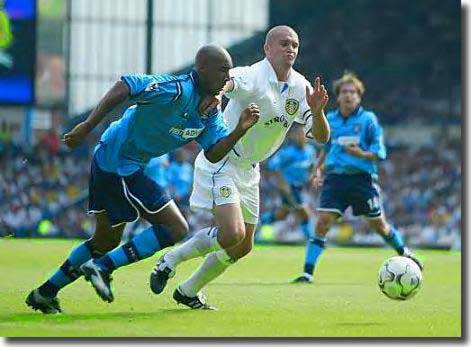 as
easy victors in the end.
as
easy victors in the end.
Venables: 'We knew they would throw everything at us and they did, but
we had a bit of good fortune early on, and I thought we slowly got the
game back 15 minutes before half time. I changed the way we played, which
I said we would at times, and it pleased me that we adapted well to it.'
Despite the muted response, it was clear that the chirpy Londoner felt
his side could genuinely contend for Premiership glory.
The optimism was rudely dispelled, however, as Leeds lost 1-0 in midweek
at home to struggling Sunderland. Tellingly, the game brought Sunderland's
first goal and points of the season, providing much needed solace to Peter
Reid, their beleaguered manager. Days later, Leeds came away pointless
from a trip to the third promoted side, Birmingham City.
The departure of 22-year-old Robbie Keane in a £7m move to Tottenham
before the transfer window closed at the end of August brought more grumbling,
particularly when the replacement was an unknown Swedish defender, Teddy
Lucic, joining on a loan deal from AIK Solna. He had seen previous
action in Serie A with Bologna, but was not the sort of high profile name
the fans had hoped for, while the exciting Keane had been a favourite
with the fans.
The expected big money arrivals had failed to materialise and the fans
wanted to know what had happened to the treasure trove generated by Rio
Ferdinand's departure. When it had looked like there would be money to
rebuild, the fans grudgingly accepted the sale as good business, but now
it was apparent that the bargain basement was the only store in town.
This was no brave new world.
The mood around Elland Road was noticeably lighter than during the final
six months of David O'Leary's time, but there were few signs that Terry
Venables was the Messiah who could rescue a club firmly on the downward
curve.
Since his arrival at Elland Road, the manager had bemoaned the lack of
opportunity to work on the training ground to get the players in tune
with the style he wanted to employ, but the season's first round of international
games brought an opportunity to do so. However, call-ups for those matches
decimated his squad.
'I don't welcome this break at all,' said Venables. 'The problem now
is that we've played Wednesday, played Saturday and you think to yourself
that you want a nice clear week to top and tail what I want to do with
them, but they're all off and I can't. I suppose the rest of the clubs
are the same, but with me not knowing them as much it makes it a bit frustrating.
We've almost got to close down whilst all the internationals are away.'
However, both Alan Smith and Lee Bowyer were on their way to memorable
performances for England against Portugal. 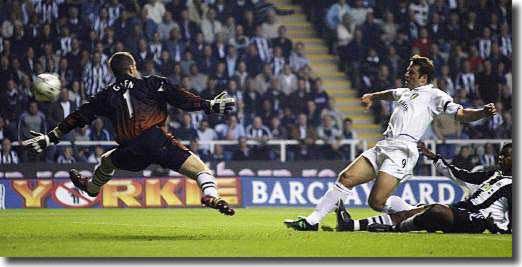 Smith
scored his first international goal with a remarkable diving header and
Bowyer gained his long delayed first cap, laying on the goal for his team
mate.
Smith
scored his first international goal with a remarkable diving header and
Bowyer gained his long delayed first cap, laying on the goal for his team
mate.
The pair took their good form into their next club game, at Newcastle
United's St James' Park, as Leeds pulled off one of the season's most
outstanding results. Five minutes in, Harry Kewell broke clear on the
left and crossed for Mark Viduka to open the scoring. The Newcastle defenders
vainly appealed that Kewell had been offside, but the fault was more with
their slack marking than the assistant referee.
After that, Paul Robinson demonstrated the form that had seen him promoted
to the England bench by pulling off a string of marvellous saves, denying
Newcastle again and again. Jonathan Woodgate, who had also returned to
the international fold against Portugal, was another star performer as
Leeds gave ample proof of their defensive resilience.
Three minutes from time, Smith crowned a wonderful personal week by blasting
home a splendid second goal from the edge of the area after Newcastle
failed to clear a corner.
back to top
The 2-0 score was flattering, but Venables had seen his side demonstrate
some real potential, lifting his spirits: 'I'm really very pleased for
the players, they worked very, very hard and everyone played their part.
This is a very hard place to come and get a result.'
When Rio Ferdinand returned to Elland
Road with his new Old Trafford colleagues a few days later and went
home disconsolate after losing out to Harry Kewell's header, things suddenly
became even rosier. Leeds United 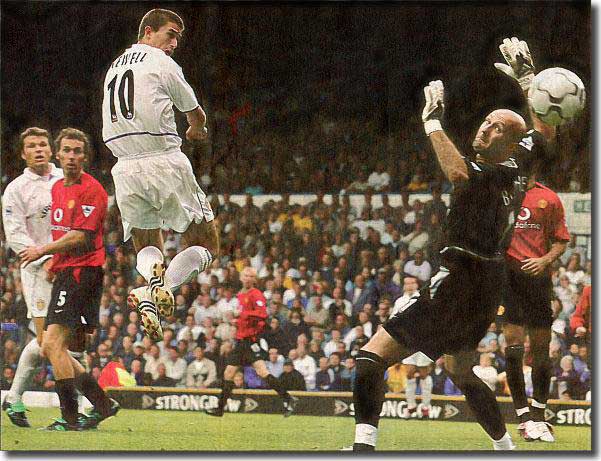 victories
over Manchester United are rare things, and the crowd forgot for a while
their feelings of betrayal.
victories
over Manchester United are rare things, and the crowd forgot for a while
their feelings of betrayal.
Two such unexpected victories provided a marvellous fillip, and the early
kick off time of the United match meant that for a few hours at least,
Leeds United sat on top of the table.
There was more good news when striker Michael Bridges, out of action
with a bad injury for the best part of two years, returned to the subs'
bench for the UEFA Cup tie against Metalurgh Zaporizhzhya of the Ukraine.
He came on to heartfelt applause after 64 minutes with Leeds struggling
for a goal, and had a key role when Alan Smith finally broke the deadlock.
It looked like the Ukrainians would escape with a priceless 0-0 draw
after a mean defensive display, but Bridges seemed to act as a good luck
charm. There were just ten minutes remaining when Leeds finally pierced
the defensive rearguard. Ian Harte pumped a ball forward and Bridges was
lightning quick to get on the end of it. He prevented it going out for
a goal kick right on the byeline, then with a defender in close attention
he turned it back into the path of Smith who fired home from six yards.
Leeds couldn't add to the goal and were disappointed with their performance,
but had crucially managed to keep a clean sheet. Terry Venables said afterwards:
'I thought Michael did very well. It has been a hard story for him. He
must have had times when he was very low. But in the two years he has
been out he has worked extremely hard. He has been frustrated because
he wanted to get back into the team, but this was a big moment for him
tonight and I thought he not only played well but contributed well to
the goal. I am very happy for him.'
back to top
Venables was less enamoured, however, with events in the weeks that followed.
Alan Smith missed a penalty as Leeds went down by a single goal at Blackburn,
and then were on the wrong end of a resounding 4-1 drubbing at home to
champions Arsenal, who were in outstanding form as they chased a second
title in succession. Some of the Gunners' football was breathtaking, but
Leeds' own problems were evident for all to see.
Ian Harte had been given a chasing by Keith Gillespie at Blackburn and
was omitted against Arsenal, with Danny Mills switched to left back and
Gary Kelly on the other flank. The changes left Leeds looking lop-sided
and out of sorts and if truth be known the result was flattering, for
Arsenal had won at a canter.
A late equaliser from Nick Barmby saw Leeds through in the UEFA Cup away
to Metalurgh. Back in domestic football, however, Leeds' stop start campaign
continued to stutter. Neither one of two poor sides could manage a goal
when United visited Aston Villa on 6 October, and then Leeds lost 1-0
at home to Liverpool. Twice Leeds took the lead at Middlesbrough, twice
conceded an equaliser, and then saw Alan Smith dismissed for a second
bookable offence, harsh though the decision seemed to be. Everton won
at Elland Road for the first time in more than fifty years when the youthful
Wayne Rooney made Lucas Radebe look leaden footed. Even worse, two goals
in the closing seconds saw a Worthington Cup lead at First Division Sheffield
United turned upside down and Leeds tumbling out of the competition at
their first hurdle.
The first half-hearted cries of 'Venables Out' were heard on the terraces.
'It is frustrating, we are not getting the results that our play deserves,'
said Venables.
The frowns were temporarily lifted by a gripping 4-3 win at West Ham,
but Leeds had almost contrived to throw away a 4-1 half time lead and
had been left hanging on grimly for three points which would be so crucial
at the end of the season. West Ham were in the most appalling run of form,
and defended abysmally in the first half, allowing Barmby, Kewell (2)
and Viduka to profit.
The Hammers looked a different side in the second half as they enjoyed
almost total dominance. The United team retreated into desperate defence,
looking bemused and bewildered in the face of a determined and sustained
assault. Terry Venables was on the edge of his seat throughout a terrible
second half, but could at least breathe a sigh of relief at the end.
Mixed in with those stuttering performances had come two UEFA Cup ties
with Hapoel Tel Aviv, both of which Leeds had managed to win. In fact,
the second away match (held in the neutral stadium of Fiorentina in Florence)
had seen Alan Smith turn in a virtuoso performance with all four goals
in a sparkling 4-1 success. The Israelis had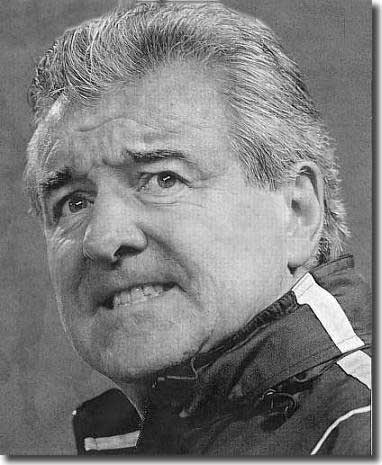 pilloried Smith after the first leg for his aggressive approach, but he
now showed what a good player he is, revelling in the praise of his exultant
manager.
pilloried Smith after the first leg for his aggressive approach, but he
now showed what a good player he is, revelling in the praise of his exultant
manager.
It was only a temporary relief, however, for Venables, as he suffered
a string of dire results. Any faint hopes Leeds still harboured of a decent
season vanished completely during November and December.
After the Hapoel victory, Leeds lost four straight Premiership matches,
with the first an amazing 4-2 defeat at home to Bolton Wanderers who,
like Sheffield United, came back strongly at the death. Leeds had the
lead, then saw Bolton equalise before two late goals stole all three points.
The Times ran an interesting piece on Lee Bowyer, who was rumoured
to be off to Tottenham: 'Bowyer's loss of form has contributed to five
defeats in seven home Barclaycard Premiership matches, although others
such as Harry Kewell and Mark Viduka, have been performing worse. It is
a dressing-room where too many players appear to have one eye on the exit,
but Bowyer is annoyed by the suggestion that he is ticking over until
the day he can leave.
'"They can use me as a scapegoat - it has happened in the past -
but if I am performing on the pitch, then what more can I do?" he
said. 'Would you rather someone on a four-year contract who is not going
to do as well as me? Our record is crazy and I don't know why. We have
two good results and then I turned on Teletext at home on Sunday and it
was 4-2. You just think: How have we lost 4-2 against Bolton at home?
These are the same players we had when we almost won the title and got
to the semi-finals of the Champions League.
"'I never had a problem with David O'Leary, but it started last year.
Before then, things were fine. The club has brought in a new manager,
but he can't work miracles. I feel sorry for him because it must be so
frustrating to see the quality of players and yet it is just not happening.
He is there every hour he can be. We just had a meeting. He said: Listen,
it's mad. It is 2-2 with five minutes left and you have put six men in
the box for a free kick. We have good enough forwards that we can get
a goal without throwing everyone forward, but they break, score and it
is over. You are unbeaten for two games and then you lose to Bolton at
home and you are low again."'
Some of this smacked a little of self-justification for a disenfranchised
talent, but clearly there were problems in the camp and Leeds United were
tottering on a dangerous precipice. No one, it seemed, could adequately
explain what had happened to the most exciting young team in the Premiership.
The loss of Ferdinand and Keane had been damaging, sure, but Terry Venables
still had a strong squad from which to pick, and one which had been good
enough to beat both Newcastle and Manchester United without conceding
a goal. However, he also had a dispirited group which could lose to Sunderland,
Birmingham, Bolton and Sheffield United, and for which the clichéd phrase
'too good to go down' could have been invented.
Part 2 Closing down sale - Part
3 A great escape - Results and table
back to top













 judgment, it is a safe bet his relationship with Ridsdale would not have
disintegrated to the point that his first day on holiday will be spent
contemplating a new life among the nation's unemployed.
judgment, it is a safe bet his relationship with Ridsdale would not have
disintegrated to the point that his first day on holiday will be spent
contemplating a new life among the nation's unemployed. The
Leeds United faithful started to rumble and grumble as days went by with
no more news, but there was still a crowd of 40,000 plus for the opening
game, as newly promoted Manchester City visited Elland Road. Young keeper
Paul Robinson was preferred in the net to Nigel Martyn, following the
England international's decision not to accompany the squad on a pre-season
tour, while Barmby made his debut. A fit again Lucas Radebe partnered
new captain Dominic Matteo at the heart of the defence, with Danny Mills
and Ian Harte also present after good showings in the World Cup finals.
Eirik Bakke and Lee Bowyer completed the midfield set up, while the manager
went for three up front with Mark Viduka, Alan Smith and Harry Kewell.
The 4-3-3 formation looked interesting and hinted at a refreshing approach.
Venables had spoken of his desire to employ Kewell as an out and out striker,
rather than his customary left flank role.
The
Leeds United faithful started to rumble and grumble as days went by with
no more news, but there was still a crowd of 40,000 plus for the opening
game, as newly promoted Manchester City visited Elland Road. Young keeper
Paul Robinson was preferred in the net to Nigel Martyn, following the
England international's decision not to accompany the squad on a pre-season
tour, while Barmby made his debut. A fit again Lucas Radebe partnered
new captain Dominic Matteo at the heart of the defence, with Danny Mills
and Ian Harte also present after good showings in the World Cup finals.
Eirik Bakke and Lee Bowyer completed the midfield set up, while the manager
went for three up front with Mark Viduka, Alan Smith and Harry Kewell.
The 4-3-3 formation looked interesting and hinted at a refreshing approach.
Venables had spoken of his desire to employ Kewell as an out and out striker,
rather than his customary left flank role. as
easy victors in the end.
as
easy victors in the end. Smith
scored his first international goal with a remarkable diving header and
Bowyer gained his long delayed first cap, laying on the goal for his team
mate.
Smith
scored his first international goal with a remarkable diving header and
Bowyer gained his long delayed first cap, laying on the goal for his team
mate. victories
over Manchester United are rare things, and the crowd forgot for a while
their feelings of betrayal.
victories
over Manchester United are rare things, and the crowd forgot for a while
their feelings of betrayal. pilloried Smith after the first leg for his aggressive approach, but he
now showed what a good player he is, revelling in the praise of his exultant
manager.
pilloried Smith after the first leg for his aggressive approach, but he
now showed what a good player he is, revelling in the praise of his exultant
manager.